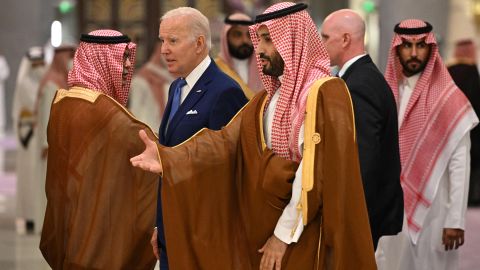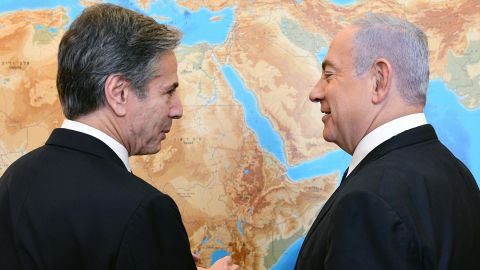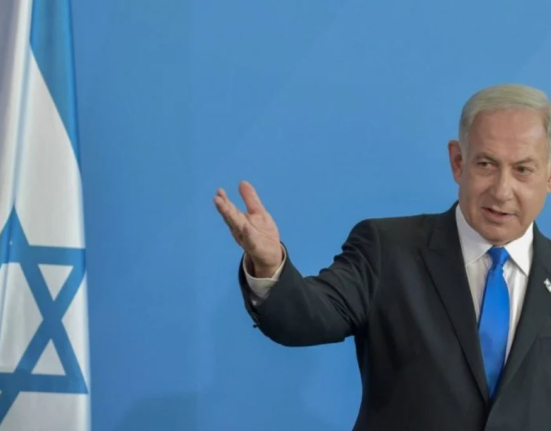
With a grandiose diplomatic flourish China brokered a rapprochement between Saudi Arabia and Iran, in the process upending US calculus in the Gulf and beyond.
While the United States has angered its Gulf allies by apparently dithering over morality, curbing arms supplies and chilling relations, Saudi Arabia’s King-in-waiting Crown Prince Mohammed bin Salman, known as MBS, has found a kindred spirit in China’s leader Xi Jinping.
Both are bold, assertive, willing to take risks and seemingly share unsated ambition.
Friday’s announcement that Riyadh and Tehran had renewed diplomatic ties was unexpected, but it shouldn’t have been. It is the logical accumulation of America’s diplomatic limitations and China’s growing quest to shape the world in its orbit.
Beijing’s claim that “China pursues no selfish interest whatsoever in the Middle East,” rings hollow. It buys more oil from Saudi Arabia than any other country in the world.
Xi needs energy to grow China’s economy, ensure stability at home and fuel its rise as a global power.
His other main supplier, Russia, is at war, its supplies therefore in question. By de-escalating tensions between Saudi and Iran, Xi is not only shoring up his energy alternatives but, in a climate of growing tension with the US, also heading off potential curbs on his access to Gulf oil.
Xi’s motivation appears fueled by wider interests, but even so the US State Department welcomed the surprise move, spokesman Ned Price saying, “we support anything that would serve to deescalate tensions in the region, and potentially help to prevent conflict.”
Iran has buy-in because China has economic leverage. In 2021 the pair signed a trade deal reportedly worth up to $400 billion of Chinese investment over 25 years, in exchange for a steady supply of Iranian oil.
Tehran is isolated by international sanctions and Beijing is providing a glimmer of financial relief.
And, in the words of Iran’s Supreme leader Ayatollah Ali Khamenei last year, there’s also the hope of more to come as he sees geopolitical power shifting east.
“Asia will become the center of knowledge, the center of economics, as well as the center of political power, and the center of military power,” Khamenei said.
Saudi has buy-in because war with Iran would wreck its economy and ruin MBS’s play for regional dominance. His bold visions for the country’s post fossil-fuel future and domestic stability depend on inwardly investing robust oil and gas revenues.
US influence on the wane
It may sound simple, but the fact the US couldn’t pull it off speaks to the complexities and nuance of everything that’s been brewing over the past two decades.
America’s wars in Iraq and Afghanistan have burned through a good part of its diplomatic capital in the Middle East.
Many in the Gulf see the development of the war in Ukraine as an unnecessary and dangerous American adventure, and some of Russian President Vladimir Putin’s territorial claims over Ukraine not without merit.
What the global West sees as a fight for democratic values lacks resonance among the Gulf autocracies, and the conflict doesn’t consume them in the same way as it does leaders in European capitals.
Saudi Arabia, and MBS in particular, have become particularly frustrated with America’s flip-flop diplomacy: dialling back relations over the Crown Prince’s role in the murder of Washington Post columnist Jamal Khashoggi (which MBS denies); then calling on him to cut oil production swiftly followed by requests to increase it.
These inconsistencies have led the Saudis to hew policy to their national interests and less to America’s needs.
During his visit to Saudi last July, US President Joe Biden said: “We will not walk away and leave a vacuum to be filled by China, Russia, or Iran.” It seems now that the others are walking away from him.
China steps up
On Beijing’s part, China’s Gulf intervention signals its own needs, and the opportunity to act arrived in a single serving.
Xi helped himself because he can. The Chinese leader is a risk taker.
His abrupt ending of austere Covid-19 pandemic restrictions at home is just one example, but this is a more complex roll of the dice.
Mediation in the Middle East can be a poisoned chalice, but as big as the potential gains are for China, the wider implications for the regional, and even global order, are quantifiably bigger and will resonate for years.

Yet harbingers of this shake-up and the scale of its impact have been in plain sight for months. Xi’s high-profile, red-carpet reception in Riyadh last December for his first overseas visit after abandoning his domestic “zero-Covid” policy stirred the waters.
During that trip Saudi and Chinese officials signed scores of deals worth tens of billions of dollars.
China’s Foreign Ministry trumpeted Xi’s visit, paying particular attention to one particular infrastructure project: “China will deepen industrial and infrastructure cooperation with Saudi Arabia (and) advance the development of the China-Saudi Arabia (Jizan) Industrial Park.”
The Jizan project, part of China’s belt and road initiative, heralds huge investment around the ancient Red Sea port, currently Saudi’s third largest.
Jizan lies close to the border with Yemen, the scene of a bloody civil war and proxy battle between Riyadh and Tehran since 2014, sparking what the United Nations has described as the world’s worst humanitarian crisis.
Significantly since Xi’s visit, episodic attacks by the Iran-backed Houthi rebels on Jizan have abated.
There are other effects too: the plans to upscale Jizan’s container handling puts Saudi in greater competition with the UAE’s container ports and potentially strains another regional rivalry, as MBS drives to become the dominant regional power, usurping UAE’s role as regional hub for global businesses.
Xi will have an interest seeing both Saudi Arabia and the UAE prosper, but Saudi is by far the bigger partner with higher potential global economic heft and, importantly, massive religious clout in the Islamic world.
Rivals share common ground on Iran policy
Where the UAE and Saudi align strongly is eschewing direct conflict with Tehran.
A deadly drone attack in Abu Dhabi late last year was claimed by the Houthis, before the rebels quickly rescinded it. But no one publicly blamed the Houthis’ sponsors in Tehran.
A once shaky ceasefire in Yemen now also seems to be moving toward peace talks, perhaps yet another indication of the potential of China’s influence in the region.
Beijing is acutely aware of what a continued war over the Persian Gulf could cost its commercial interests – another reason why a Saudi/Iran rapprochement makes sense to Xi.
Iran blames Saudi for stoking the massive street protests through its towns and cities since September.
Saudi denies that accusation, but when Iran moved drones and long-range missiles close to its Gulf coast and Saudi, Riyadh called on its friends to ask Tehran to de-escalate. Russia and China did, the threat dissipated.
Questions remain over nuclear weapons
Tehran, despite US diplomatic efforts, is also closing in on nuclear weapons capability and Saudi’s MBS is on record saying he’ll ensure parity, “if Iran developed a nuclear bomb, we will follow suit as soon as possible.”
Late last week US officials said Saudi was seeking US security guarantees and help developing a civilian nuclear program as part of a deal to normalize relations with Israel, an avowed enemy of Iran’s Ayatollahs.
Indeed, when US Secretary of State Antony Blinken visited Israel late January, concerned over a rising Palestinian death toll in a violent year in the region, potential settlement expansions and controversial changes to Israel’s judiciary Prime Minister Benjamin Netanyahu spoke to Blinken about “expanding the circle of peace,” and improving relations with Arab neighbours, including Saudi Arabia.

But as Saudi seems to shift closer to Tehran, Netanyahu’s mission just got harder. While both Saudi and Israel strongly oppose a nuclear-armed Iran, only Netanyahu seems ready to confront Tehran.
“My policy is to do everything within Israel’s power to prevent Iran from acquiring nuclear weapons,” the Israeli leader told Blinken.
Riyadh favors diplomacy. As recently as last week the Saudi foreign minister said: “It’s absolutely critical … that we find and an alternative pathway to ensuring an (Iranian) civilian nuclear program.”
By improving ties with Tehran, he said, “we can make it quite clear to the Iranians that this is not just a concerns of distant countries but it’s also a concern of its neighbors.”
For years this is what America did, such as brokering the Iran nuclear deal, or JCPOA, in 2015.
Xi backed that deal, the Saudis didn’t want it, Iran never trusted it, Biden’s predecessor Donald Trump’s withdrawal confirmed Iran’s fears and sealed its fate, despite the ongoing proximity talks to get American diplomats seated at the table again.
Iran has raced ahead in the meantime, massively over-running the bounds of the JCPOA limits on uranium enrichment and producing almost weapons-grade material.
What’s worse for Washington is that Trump’s JCPOA withdrawal legacy tainted international perceptions of US commitment, continuity and diplomacy. All these circumstances perhaps signaled to Xi that his time to seize the lead on global diplomacy was coming.
Yet the Chinese leader seems to accept what Netanyahu won’t and what US diplomacy is unable to prevent: that sooner, rather than later, Iran will have a nuclear weapon. As such, Xi may be fostering Saudi-Iran rapprochement as a hedge against that day.
So Netanyahu looks increasingly isolated and the Israeli leader, already under huge domestic pressure from spiking tensions with Palestinians and huge Israeli protests over his proposed judicial reforms, now faces a massive re-think on regional security.
Pieces of regional puzzle shifting
The working assumption of American diplomatic regional primacy is broken, and Netanyahu’s biggest ally is now not as hegemonic as he needs. But by how much is still far from clear.
It’s not a knockout, but a gut blow, to Washington. How Xi calculates the situation isn’t clear either. The US is not finished, far from it, but it is diminished, and both powers are coexisting in a different way now.
Earlier this month, the Chinese leader made unusually direct comments accusing the US of leading a campaign against China and causing serious domestic woes.
“Western countries led by the United States have contained and suppressed us in an all-round way, which has brought unprecedented severe challenges to our development,” Xi told a group of government advisers representing private businesses on the sidelines of an annual legislative meeting in Beijing.
Meanwhile, Biden has defined the future US-China relationship as “competition not confrontation,” and he has built his foreign policy around the tenets of standing up for democracy.
It is striking that neither Xi, nor Khamenei, nor MBS are troubled by the moral dilemmas that circumscribe Biden. This is the big challenge the US president warned about, and now it’s here. An alternative world order, irrespective of what happens in Ukraine.
Source: CNN
















